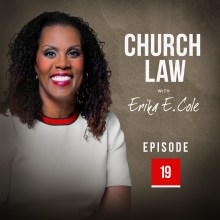Available on:
Volunteers represent the lifeblood of most any church and finding enough of them is always a challenge. Yet volunteers, by their very nature, act as representatives of a church—and any missteps with their screening, selection, supervision, and training can unfortunately open the door to unwanted legal troubles.
In this episode, Erika delves further into the legal theories behind these potential vulnerabilities for churches, then offers quick tips that can help minimize them across key ministry areas where volunteers most often serve, including children’s and youth ministries, worship services, and transportation.
SHOW NOTES:
- HR Matters for Churches, Episode 12 of the Church Law podcast
- Vicarious Liability (Respondeat Superior), by Richard R. Hammar
- Keeping Children Safe in Your Church, Episode 15 of the Church Law podcast
- Minimizing the Risks of Child Molestation in Churches, by Richard R. Hammar
- Directors and Officers Insurance, by Richard R. Hammar
- Risks Associated with Cell Phones, by Richard R. Hammar
Questions? We welcome them! Please email Erika Cole at contact@takethenextcall.com. Erika reads each comment and may answer your question in an upcoming episode.
See all episodes of Church Law.
The Church Law podcast is part of Christianity Today’s ChurchLawAndTax.com, a not-for-profit publishing ministry.
This content is designed to provide accurate and authoritative information in regard to the subject matter covered. It is sold with the understanding that the publisher is not engaged in rendering legal, accounting, or other professional service. If legal advice or other expert assistance is required, the services of a competent professional person should be sought. "From a Declaration of Principles jointly adopted by a Committee of the American Bar Association and a Committee of Publishers and Associations." Due to the nature of the U.S. legal system, laws and regulations constantly change. The editors encourage readers to carefully search the site for all content related to the topic of interest and consult qualified local counsel to verify the status of specific statutes, laws, regulations, and precedential court holdings.
